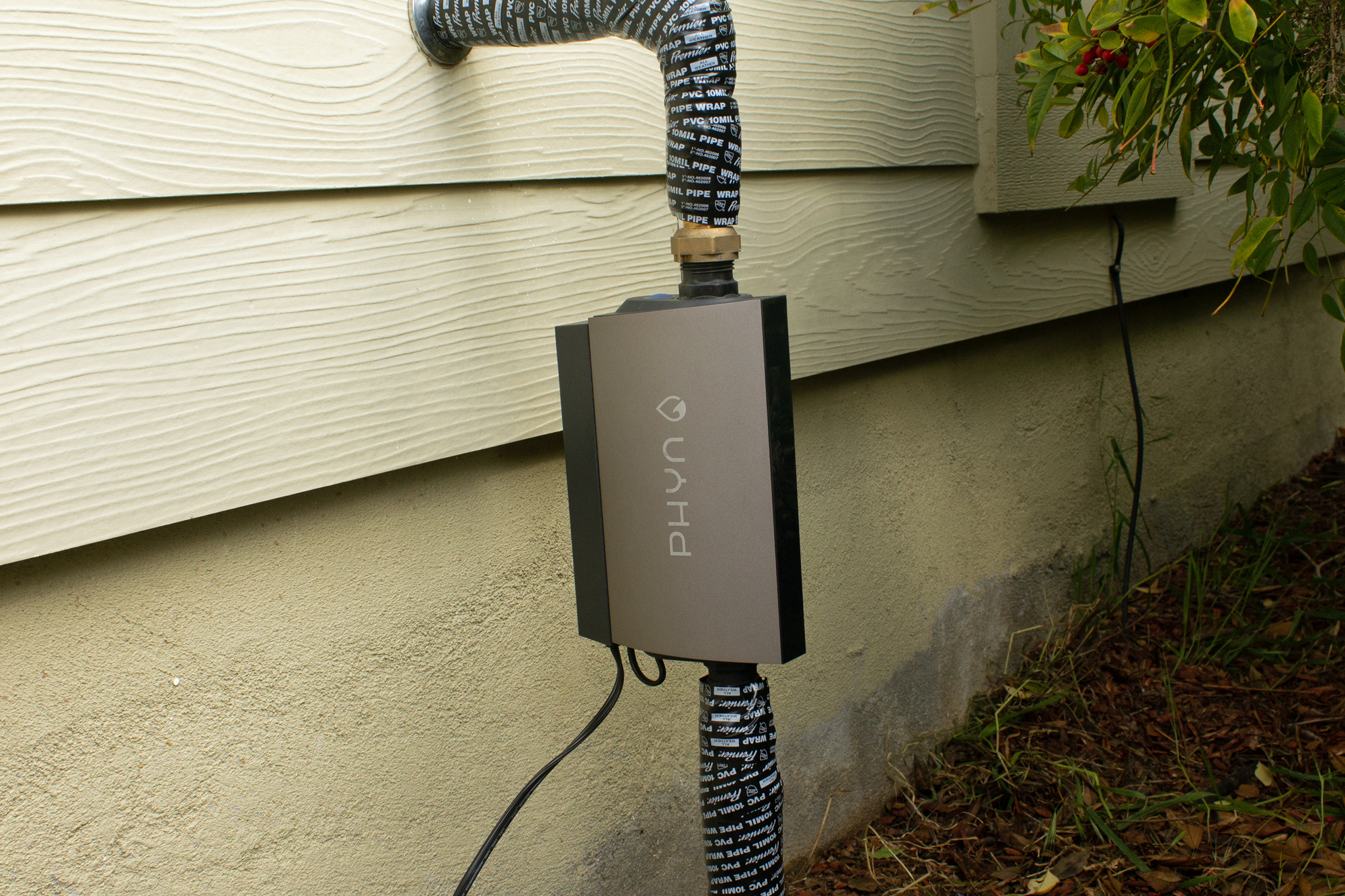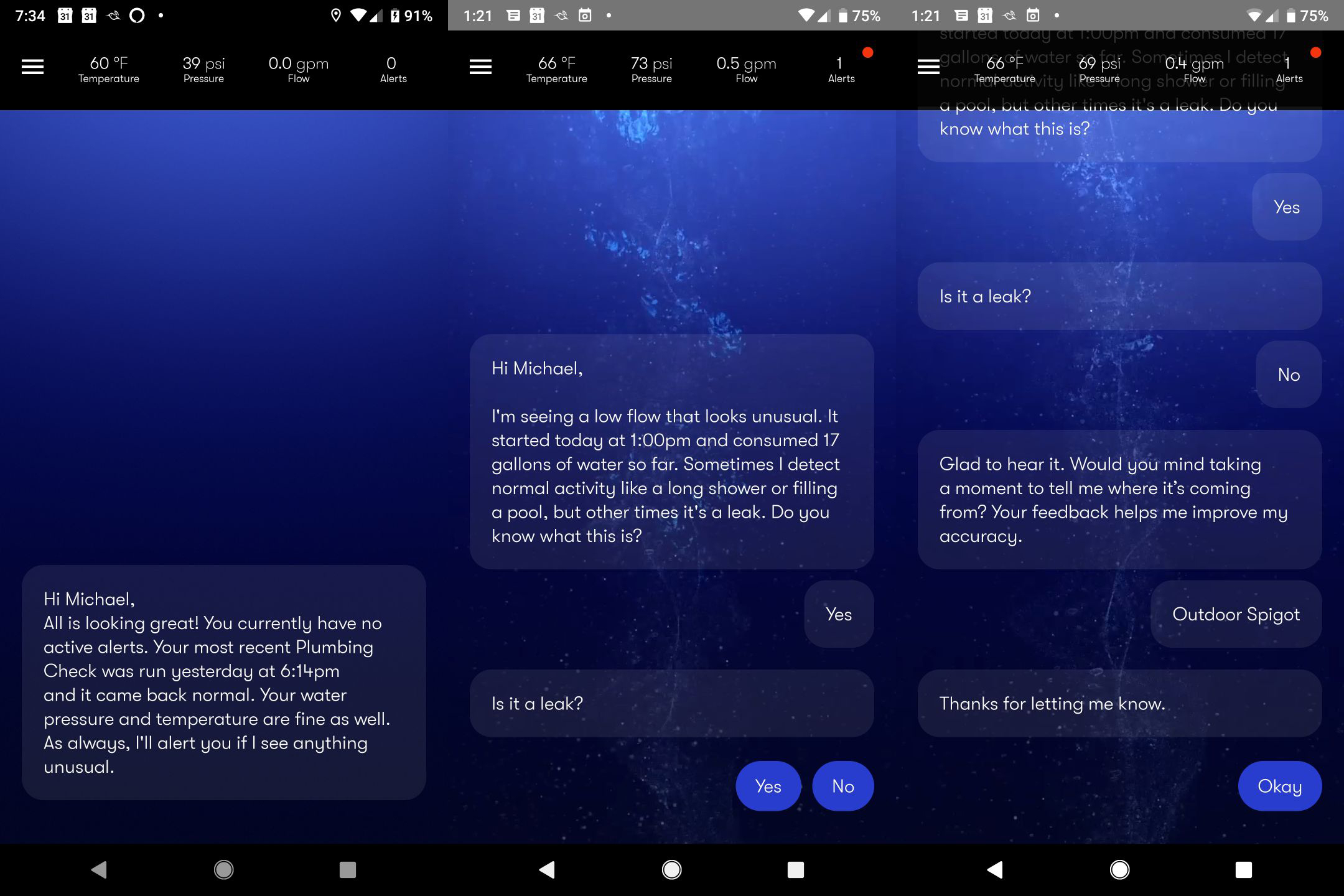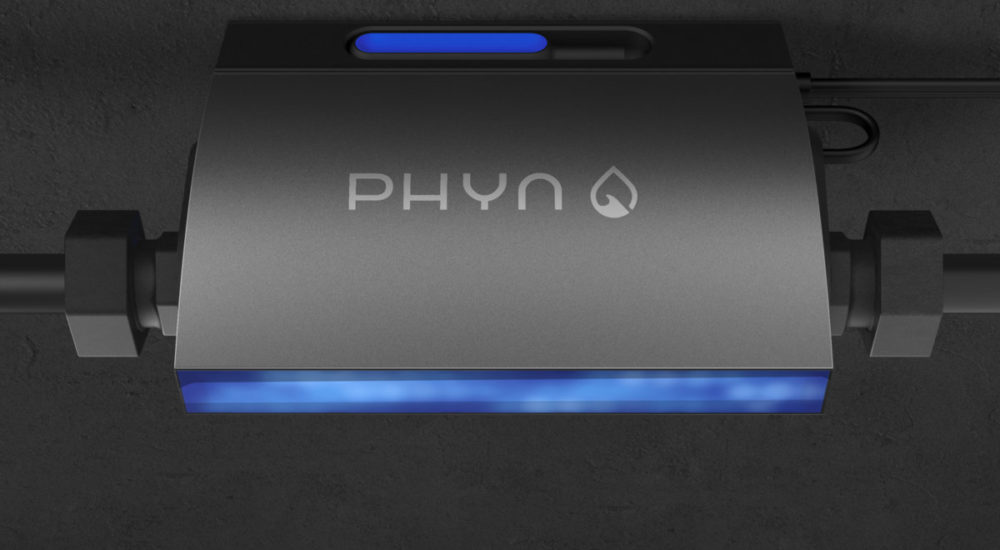If all you want from a smart water valve is for it to turn off your main water supply if it detects a potentially devastating leak anywhere in your plumbing, the $499 Flo by Moen is the better value. But for $200 more, the Phyn Plus will do that and provide you with a moment-by-moment analysis of how you’re using water—something that Flo expects you to pay an additional $5 per month for in perpetuity.
You can purchase a Phyn Plus through Phyn’s co-parent Uponor’s network of plumbers (Uponor Pro Squad), who will handle the install; or you can purchase it directly and either install it yourself or have your own plumber handle the job. For the record, Phyn recommends having a pro do the job, and the company hired a local firm to install mine.
(Note: This review is part of our ongoing coverage of smart water leak detection devices. You’ll find all our related coverage here.)
As with the Flo by Moen, this smart valve is installed on your main water supply and is fully weatherized for either outdoor or indoor installations. Because the Phyn Plus is a motorized valve, you will need an electrical outlet within 15 feet of the valve to plug in its power supply (it should be a GFCI outlet protected by a bubble cover if it’s outside). I have a tankless water heater in an exterior closet near the water main, so I plugged it in there. Unlike Flo, Phyn doesn’t offer an electrical extension for the Phyn Plus.

You’ll also want to make sure your Wi-Fi network has sufficient range to reach the Phyn Plus. My own network is based on a three-node Velop system, and I have one node in a bedroom that’s about 25 feet from the valve. There were times when I took the Velop system down to test other Wi-Fi routers that Phyn reported being unable to reach the network (even though I used the same SSID for those routers). I’d recommend measuring your Wi-Fi signal strength where you’ll be installing the Phyn.
Phyn Plus sensors
The Phyn Plus is equipped with sensors that measure the current water temperature and—if you’re using water anywhere in your home—the current water flow. More importantly, the device is equipped with ultrasonic sensors that measure the water pressure in the line as many as 240 times each second.
Temperature, pressure, and flow rate (in gallons per minute) are reported in very near real time to the Phyn app, which is available for Android and iOS. When I would turn on a faucet in the house, the app would report the flow rate and show a slick animation in less than a second.
This information is uploaded to the cloud, where Phyn’s algorithms analyze the data (pressure change, flow rate, and water temperature) to determine if it seems to be normal water use or something that could be a problem, such as a leaky pipe, faucet, valve, or toilet. Phyn will push an alert to your smartphone if anything looks amiss, including if the water temperature drops too low, indicating the possibility of a frozen pipe that could burst and cause catastrophic damage (a situation I’m personally all too familiar with).

While I like the Phyn Plus more than the Flo by Moen overall, Flo offers one significant advantage. If the Flo by Moen detects what could be a water emergency, the company will robo-call you informing you that it has detected an anomaly with your plumbing and warn that your water is about to be shut off. If you push a button on your phone in response to signal that you know what the unusual water flow is, the valve will ignore the alert for a few hours. If you don’t do anything, or if you miss the call, the valve will shut off your water.
The Phyn Plus will do the same thing if you don’t respond to its push notification, but its alerts are much easier to miss than a phone call is.
The Phyn Plus’s alerts are very informative, reporting the time the anomalous water flow started, the number of gallons that has flowed so far, and asking if you know what the event is. Your answers will determine whether the valve gets closed or remains open, and you’ll have an opportunity to categorize the flow to help Phyn’s algorithm recognize similar events in the future.
The Phyn Plus app
It is Phyn’s algorithms and water-use analysis—and the fact that they are included in the price of the valve, versus a pay-forever subscription—that give the Phyn Plus the biggest edge over the Flo by Moen. Phyn provides so much information that it’s split into two sections in the Phyn app: Water Use and Water Use Plus. The Water Use section uses bar charts to report the number of gallons of water you’ve used for the month. Select any date on the chart and you’ll be presented with an hour-by-hour breakdown.
The second report is more detailed—and far more informative. It is also, however, labeled as being in beta. Dubbed Water Use Plus, it presents your monthly water consumption in a calendar format (and as a heat map) and tracks each water-use event.

Click on any day of the month, and the app will show how many gallons were consumed on that day, the number of water-use events that were logged on that day, and Phyn’s best guess as to how much water each device in your home—toilet, shower, sink, outdoor spigot, washing machine, dishwasher, and so on—consumed. If you want even more detail, you can click on each device and drill down to see the time each water event occurred, how long it lasted, and how many gallons were consumed during that event.
If you wanted to help improve the accuracy of the Phyn Plus you could jot down every water-use event, compare it to Phyn’s log, and either report it as being accurate or re-categorize any event that Phyn gets wrong.
There’s a long list of devices for which you can log events, ranging from bidets to swamp coolers. Personally, I can’t imagine taking the time to do that level of micromanagement, but it is an option. I think most people will use Water Use Plus to identify water waste: over-watering your lawn or garden; taking excessively long showers; washing your clothes or dishes in smaller, more frequent loads, rather than fewer, bigger loads; and so on.

One other feature that the Flo by Moen offers that the Phyn Plus doesn’t is a means for setting water-consumption goals and measuring your performance against them. The Phyn app doesn’t suggest how much water your household should consume, either. Neither device incorporates sensors that detect water in places it shouldn’t be—around the base of a leaky toilet, for instance, or next to a malfunctioning washing machine.

Because of that, neither the Flo nor the Phyn Plus smart valve will react immediately to a water leak, because they monitor patterns versus the physical presence of water. If you think you’d be better served by a product that reacts more quickly, take a look at the Sinopé Sedna leak-protection kit. The downside of the Sedna, of course, is that water could leak from a whole lot of other places than where you’ve placed sensors. A slow leak from a pipe inside your home’s wall, for instance, could cause a great deal of damage, and Sinopé’s sensor might never detect it.
Which is better: Phyn Plus or Flo by Moen?
It’s a close call, but I give the edge to the Phyn Plus smart water valve. I do like the way that Flo Technologies’ service will robo-call if the valve detects a possible leak, and the app’s water-usage goals might help you reduce your consumption of one of our most precious resources. But Phyn’s algorithms seem more sophisticated, its app is more elegant, and the company won’t make you pay for a subscription to get the full use of the product.
The Phyn Plus smart water valve is expensive, even after its recent $200 price cut, but this class of device can prevent costly water damage to your home and help you use a precious resource more wisely. That there is no ongoing subscription cost is a major plus.
Pros
- Can shut off your main water supply in the event of a leak, burst pipe, etc.
- Analyzes your water consumption to help you manage your use
- Can identify plumbing problems and limit costly water damage
- No ongoing subscription cost to get the full use of the product
Cons
- More expensive than the similar Flo by Moen smart valve (which does have a subscription, although it is optional)
- Doesn’t support sensors that can detect the presence of water in places it shouldn’t be
- Push messages—and their warnings—can be easily missed (Flo by Moen’s robo calls are more effective)
Source: techhive.com




































